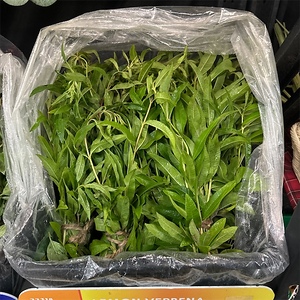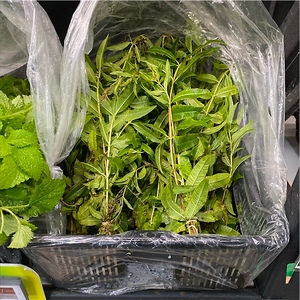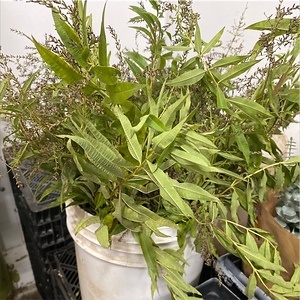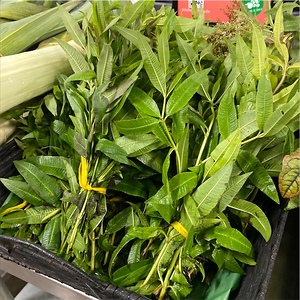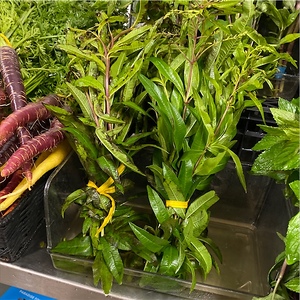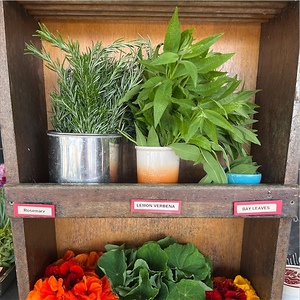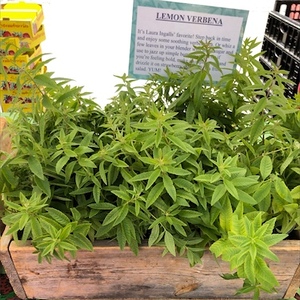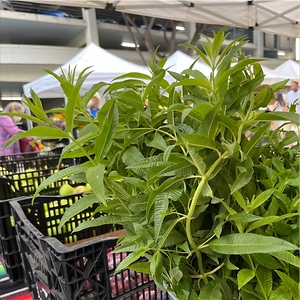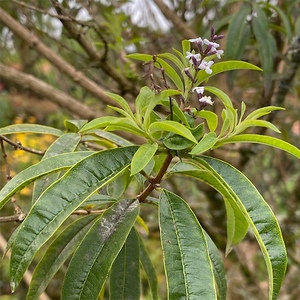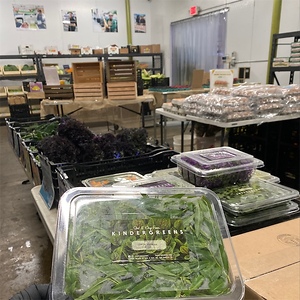


Lemon Verbena
Estimated Inventory, lb : 0.07
This item was last sold on : 07/23/25
Description/Taste
Lemon Verbena is comprised of elongated leaves, averaging 7 to 10 centimeters in length, that bear a lanceolate shape with a pointed, tapered non-stem end. The leaves grow in groupings of three around the stem and have a semi-rough, tough, and leathery texture. The leaf’s surface is also green and glossy, featuring prominent veining. In the late spring through early summer, the shrubs produce tiny white or purple, four-petaled flowers that are edible and sometimes used as a delicate garnish. Lemon Verbena leaves are known for their robust and bright, lemon-like, floral, and spice-filled aroma when bruised, crushed, or disturbed. The leaves also contain a delicate and herbal sweetness mixed with a mild citrus flavor.
Seasons/Availability
Lemon Verbena is available year-round, with a peak season in the summer.
Current Facts
Lemon Verbena, botanically classified as Aloysia citrodora, is an aromatic shrub belonging to the Verbenaceae family. The perennial flowering plant averages 3 to 5 meters in height, depending on climate and pruning, and is native to South America, where the leaves were favored as a soothing medicinal aid. Lemon Verbena is also known as Lemon Beebrush and Herb Louisa, preferred by chefs and herbalists for its aromatic citrus scent. The shrub contains glands on the underside of the leaves, releasing concentrated, aromatic oils, which contribute a delicate citrus flavor to fresh and cooked preparations. In the modern-day, Lemon Verbena is an adaptable herb grown worldwide for mixology, culinary, and medicinal purposes.
Nutritional Value
Lemon Verbena is rich in essential oils commonly used in herbal remedies for digestive ailments and upset stomach. The leaves are steeped in hot water, and the mixture is frequently consumed after meals to aid in digestion. Lemon verbena teas have also been used to soothe symptoms associated with colds and flu, including fevers, chills, and congestion. In addition to teas, Lemon Verbena can be incorporated into mouthwash, or the essential oils can be mixed with creams as a topical pain reliever.
Applications
Lemon Verbena is a versatile herb well suited for both sweet and savory dishes. The young and tender leaves can be finely sliced and used raw in pestos, salsa, vinaigrettes, and marinades for meats, or they can be tossed into salads, stirred into soups, or infused as flavoring into ceviche. Larger, more mature leaves should be reserved for cooked preparations and are often used whole as a flavoring and then removed before consumption. The leaves can be incorporated into oils, syrups, and sugar, used to flavor jellies, jams, and fruit glazes, or infused into desserts such as crème brulee, ice cream, tarts, panna cotta, pudding, and sorbet. Lemon Verbena leaves can also be used to flavor drinks such as iced tea, spritzers, lemonade, and mixed drinks. Tea infused with Lemon Verbena is a popular drink in European and South American households. Lemon Verbena pairs well with fruits such as strawberries, raspberries, pears, peaches, melons, and apricots, meats such as pork, poultry, and fish, and herbs including thyme, mint, basil, and lavender. Fresh Lemon Verbena leaves should be used immediately for the best quality and flavor and will keep up for two days when stored in a sealed container in the refrigerator. The leaves can also be dried for extended use and kept in a cool and dark place away from direct sunlight.
Ethnic/Cultural Info
Lemon Verbena was widely used as a fragrance and flavoring in the Victorian Era in England. During this time, the aromatic shrub was a recent introduction into English gardens and was brought by Spanish explorers from South America to Europe. Lemon Verbena was first used as an air freshener in homes, and both fresh and dried leaves were added to baths, potpourris, soaps, and oils. Over time, the delicate lemon scent of the leaves became highly favored among English socialites, and the leaves were stuffed into herb sachets to smell as a reprieve on hot days. Lemon Verbena leaves were also strategically placed in clothing as a natural perfume and were infused into the water for finger bowls at social events, a practice that was prominently seen at English culinary events since the Middle Ages. In addition to fragrance, Lemon Verbena was also steeped in hot water as a soothing tea and was infused into desserts as a subtle flavoring.
Geography/History
Lemon Verbena is native to South America, specifically Argentina, Peru, and Chile, and has been growing wild since ancient times. The shrub was used by native peoples in South America as a medicinal and culinary ingredient and was also viewed as a natural insect repellant. In the 17th century, Lemon Verbena was introduced to Europe by Spanish explorers, where it was widely planted in gardens across southern Europe, naturalizing in temperate climates. Later in the 18th and 19th centuries, the rough leaves were introduced into the New Word throughout migrating Europeans. Today Lemon Verbena is planted worldwide and thrives in sunny, warm regions, viewed as a specialty herb. The shrub is cultivated throughout Europe, Asia, Northern Africa, Australia, North America, and South America, and is mainly grown in home gardens. Fresh Lemon Verbena can be found through farmer’s markets and distributors, while dried leaves are available in select stores and online retailers.
Featured Restaurants
Restaurants currently purchasing this product as an ingredient for their menu.
| Javier Plascencia (Animalon) | Bonita CA | 619-295-3172 |
| An's Gelato (Ariane) | San Diego CA | 619-394-9237 |
| Blue Water Estate Services | Rancho Santa Fe CA | 858-720-9831 |
| Noble Experiment | San Diego CA | 619-446-0002 |
| Royal Polaris Sportfishing | San Diego CA | 619-226-8030 |
| Artifact at Mingei | San Diego CA | 619-846-2164 |
| Wayfarer Bread | La Jolla CA | 805-709-0964 |
| Cal A Vie | Vista CA | 760-945-2055 |
| Fifty Two Remedies Bar | San Diego CA | 858-707-7016 |
| Mille Fleurs | Rancho Santa Fe CA | 858-756-3085 |
Recipe Ideas
Recipes that include Lemon Verbena. One



